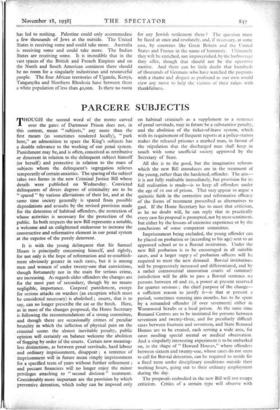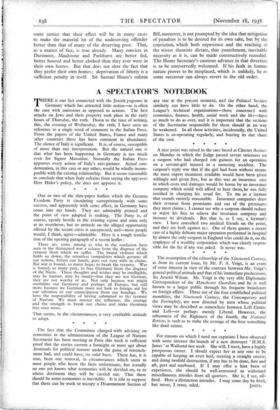PARCERE SUBJECTIS
THOUGH the second word of the motto carved over the gates of Dartmoor Prison does not, in this context, mean " subjects," any more than the first means (as sometimes rendered locally), " park here," an admonition to spare the King's subjects has a double relevance to the working of our penal system. Punishment may be, and is often, conceived as retributive or deterrent in relation to the delinquent subject himself (or herself) and protective in relation to the mass of subjects whom the delinquent's segregation relieves temporarily of certain anxieties. The sparing of the subject takes two forms in the new Criminal Justice Bill whose details were published on Wednesday. Convicted delinquents of divers degrees of criminality are to be " spared " by various alleviations of their lot, and at the same time society generally is spared from possible depredations and assaults by the revised provision made for the detention of habitual offenders, the restriction of whose activities is necessary for the protection of the public. In both respects the new Bill represents a notable, a welcome and an enlightened endeavour to increase the constructive and reformative element in our penal system at the expense of the purely deterrent.
It is with the young delinquent that Sir Samuel Hoare is principally concerning himself, and rightly, for not only is the hope of reformation and re-establish- ment obviously greater in such cases, but it is among men and women of under twenty-one that convictions, though fortunately not in the main for serious crime, are increasing. As regards older offenders the changes are for the most part of secondary, though by no means negligible, importance. Corporal pUnishment, except for serious attacks on warders (an exception which must be considered necessary) is abolished ; courts, that is to say, can no longer prescribe the cat or the birch. Here, as in most of the changes proposed, the Home Secretary is following the recommendations of a strong committee, and though there are occasionally crimes of peculiar brutality in which the infliction of physical pain on the criminal seems the almost inevitable penalty, public opinion will certainly on balance welcome the abolition of flogging by order of the courts. Certain now meaning- less distinctions, as between penal servitude, hard labour and ordinary imprisonment, disappear ; a sentence of imprisonment will in future mean simply imprisonment for a specified term of years without further refinement ; and peccant financiers will no longer enjoy the minor privileges attaching to " second division " treatment. Considerably more important are the provision by which preventive detention, which today can be imposed only on habitual criminals as a supplement to a sentence of penal servitude, may in future be a substantive penalty, and the abolition of the ticket-of-leave system, which with its requirement of frequent reports at a police-station makes the released prisoner a marked man, in favour of the stipulation that the discharged man shall keep in touch with some unofficial society approved by the Secretary of State.
All this is to the good, but the imaginative reforms which the new Bill introduces are in the treatment of the young, rather than the hardened, offender. The aim— it is not fully realisable immediately, but provision for its full realisation is made—is to keep all offenders under the age of 21 out of prison. That may appear to argue a quixotic faith in the corrective and reformative efficacy of the forms of treatment prescribed as alternatives to gaol. If the Home Secretary has to meet that criticism, as he no doubt will, he can reply that in practically every case his proposal is prompted, not by mere sentiment, but either by the lessons of extensive experience or by the conclusions of some competent committee.
Imprisonment being excluded, the young offender can be placed on probation or (according to his age) sent to an approved school or to a Borstal institution. Under the new Bill probation is to be encouraged in all suitable cases, and a larger supp y of probation officers will be required to meet the new demand. Borstal institutions will be progressively increased and differentiated, and by a rather controversial innovation courts of summary jurisdiction will be able to pass a Borstal sentence oil persons between i6 and 21, a power at present reserved for quarter sessions ; the chief purpose of the change-- a sufficient reason to justify it—is that at present a period, sometimes running into months, has to be spent by a remanded offender (if over seventeen) either in Wormwood Scrubs or a local prison. At the same time Remand Centres are to be instituted for persons between seventeen and twenty-three, and for peculiarly difficult cases between fourteen and seventeen, and State Remand Homes are to be created, each serving a wide area,' for cases needing special mental or medical observation. And a singularly interesting experiment is to be embarked on, in the shape of " Howard Houses," where offenders between sixteen and twenty-one, whose cases do not seem to call for Borstal detention, can be required to reside for a fixed term under disciplinary conditions outside their working hours, going out to their ordinary employment during the day.
The proposals embodied in the new Bill will not escape criticism. Critics of a certain type will observe with some justice that their effect will be in many case; to make the material lot of the undeserving offender better than that of many of the deserving poor. That, as a matter of fact, is true already. Many convicts in Dartmoor, Maidstone and Parkhurst are better fed, better housed and better clothed than they ever were in their own homes. But that does not alter the fact that they prefer their own homes ; deprivation of liberty is a sufficient penalty in itself. Sir Samuel Hoare's reform Bill, moreover, is not prompted by the idea that mitigation of penalties is to be desired for its own sake, but by the conviction, which both experience and the teaching of the wisest theorists dictate, that punishment, inevitable necessity as it is, can be made constructively remedial. The Home Secretary's cautious advance in that direction is to be unreservedly welcomed. If his faith in human nature proves to be misplaced, which is unlikely, he or some successor can always revert to the old order.

























































 Previous page
Previous page